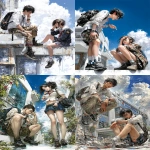Explore the Best AI Image Gallery
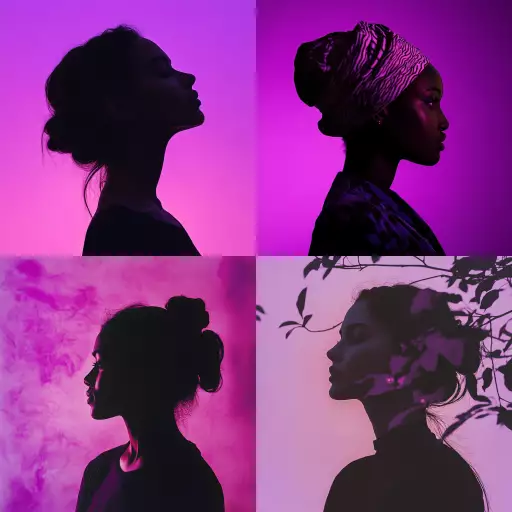
The Algorithmic Brush: Navigating the Ethics of AI-Generated Media
Artificial intelligence (AI) is rapidly transforming various facets of our lives, and the creative industry is no exception. With the advent of sophisticated algorithms capable of generating stunning visuals, music, and even written content, the landscape of art and media is undergoing a profound shift. While this presents exciting possibilities for innovation and expression, it also raises critical ethical questions that demand careful consideration.
The Creative Potential Unleashed
AI-generated media has the potential to revolutionize creative workflows and democratize access to artistic tools. Imagine:
- Artists utilizing AI algorithms to rapidly generate design concepts, exploring a wider range of possibilities with ease.
- Musicians collaborating with AI to compose unique melodies or harmonies, pushing the boundaries of musical innovation.
- Writers leveraging AI to overcome writers block or brainstorm new storylines, unlocking fresh perspectives and narratives.
These are just a few examples of how AI can empower creatives and unlock new realms of artistic exploration.
Ethical Considerations: A Balancing Act
While the potential benefits are undeniable, it is crucial to address the ethical implications of AI-generated media. Some key concerns include:
Copyright and Ownership
When an AI system creates a work, who owns the copyright? Is it the developer of the AI, the user who provides the input, or the AI itself?
Bias and Representation
AI algorithms are trained on massive datasets, which may contain inherent biases that reflect societal prejudices. This can result in AI-generated content perpetuating harmful stereotypes or underrepresenting certain groups.
Misinformation and Manipulation
The ability to generate realistic images, videos, and audio opens up possibilities for malicious use, such as creating deepfakes for propaganda or disinformation campaigns.
Job Displacement
As AI becomes more capable, there are concerns about its potential impact on creative jobs. Will artists, designers, and writers be replaced by algorithms?
Navigating the Future: A Collaborative Approach
The ethical challenges posed by AI-generated media require a multi-faceted approach involving collaboration between technologists, policymakers, artists, and the public.
- Developing transparent and accountable AI systems that are explainable and auditable.
- Establishing clear guidelines and regulations regarding copyright ownership and intellectual property rights for AI-generated content.
- Promoting diversity and inclusion in AI development to mitigate bias and ensure representation.
- Encouraging critical thinking and media literacy skills to help individuals discern between authentic and AI-generated content.
By fostering open dialogue, ethical guidelines, and responsible innovation, we can harness the transformative power of AI while safeguarding the integrity of the creative industry.
Conclusion
AI-generated media is a powerful force shaping the future of creativity. Embracing its potential while navigating its ethical complexities requires thoughtful consideration, collaboration, and a commitment to responsible innovation. By striking a balance between technological advancement and human values, we can ensure that AI empowers artists, enriches our cultural landscape, and ultimately benefits society as a whole.





](https://images.ai-img.art/thumbnails/150/2f4f685af05f9526e1ac2f05f53dbb1d97bf8a65f6a41c6e67059c5ed2aa871f.webp)


](https://images.ai-img.art/thumbnails/150/6650b0d98c6fec81df8bdfb569e0033970b46a653d188dde42417e624901493f.webp)

](https://images.ai-img.art/thumbnails/150/396b1c442fa4d576e35f871ba0f3c7e52bb62c6bcee69082dbcb816a5fd3aa8c.webp)
](https://images.ai-img.art/thumbnails/150/266c825c7f03beff90a8a60e36207b8240cdf722eb1cf5db26e8adb51b992287.webp)






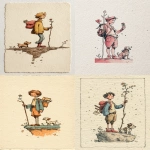


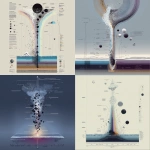
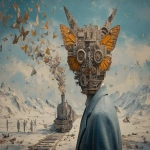





](https://images.ai-img.art/thumbnails/150/58fa7e3c741db40e9e61e20410c8d5675b11efb625df109812cc768f9b17b717.webp)
](https://images.ai-img.art/thumbnails/150/f7e46d83151e744219d4886ca1329794d3e9d5071649abea0b2996cb34c3c77c.webp)







](https://images.ai-img.art/thumbnails/150/bda14621f89269b376d6681934fea3c4af8c5f8593b80e1cb25cdf0047f98621.webp)

](https://images.ai-img.art/thumbnails/150/10ab1dbb1358d3dbba41472a395400bd9daf5cba3f5c8841970b4110820d5a15.webp)

](https://images.ai-img.art/thumbnails/150/230fb1adf4241373591167585daecc4556f4c58c4d0dc33638c62b1c60c1b72a.webp)


](https://images.ai-img.art/thumbnails/150/b814eba984b490e7f87095501b4c13b17e89f8960f044f09fbf2053969d9be29.webp)


